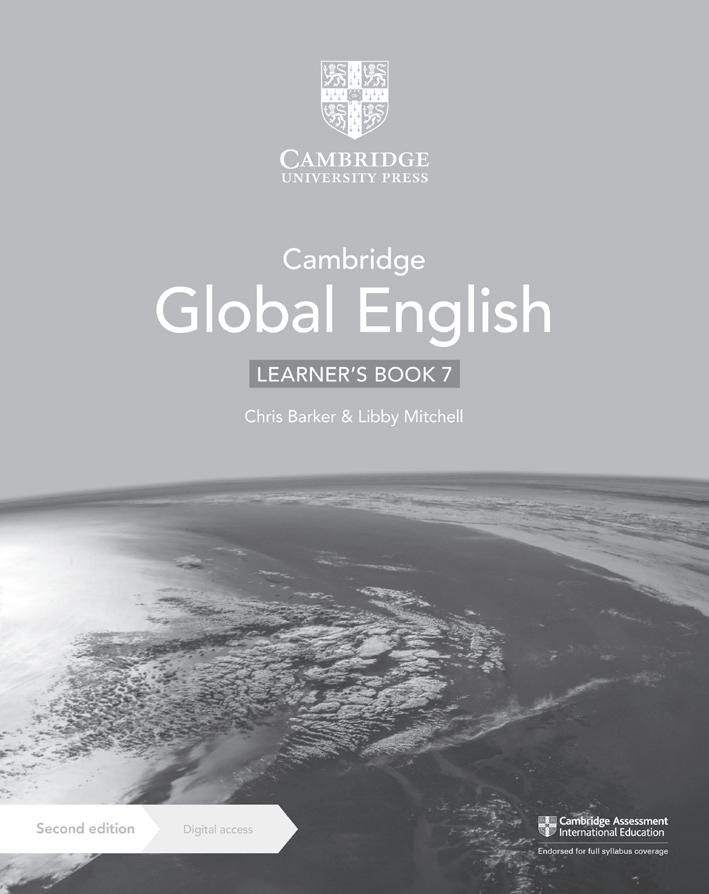
4 minute read
About the authors
Chris Barker Chris Barker is an author of English language teaching materials. With Libby Mitchell, he has written Stages 7, 8 and 9 of Cambridge Global English, for Cambridge Secondary 1 English as a Second Language. He has written secondary courses for international markets. He has also written grammar and vocabulary books and has developed materials for magazine-based language teaching. As a teacher trainer, he has given talks and workshops on teaching grammar and vocabulary, on getting students talking and on using drama in the classroom. Before becoming a full-time writer, he worked as a commissioning editor in educational publishing in the UK and as a teacher with the British Council at the University of Belgrade. He also taught adult literacy in the UK. From 2012 to 2015 he was Chair of the Educational Writers Group of the Society of Authors.
Libby Mitchell Libby Mitchell writes language-learning materials in English and Spanish for secondary school students. She has taught English to teenagers and young adults in Spain and in the UK. With co-author Chris Barker, she has written Stages 7, 8 and 9 of Cambridge Global English and other materials for international markets, including coursebooks, magazines, workbooks and videos.
Olivia Johnston Olivia Johnston has worked in ELT for more than 40 years. She has taught students aged from 3 to 70 in the UK, Europe and the Middle East. She has also taught Classics, French and adult literacy, and trained teachers in Libya. Early on in her writing career, she wrote and edited ELT magazines for children and teenagers. Since then she has written primary, secondary and adult courses for Europe, Japan, Central and South America and the Middle East, as well as grammar, vocabulary, listening and puzzle books.
Annie Altamirano Annie Altamirano holds an MA in ELT and Applied Linguistics, (University of London). She has over 30 years’ experience as a teacher and teacher trainer. She has given teacher-training workshops in Europe, Asia and Latin America and for many years she served as a Cambridge English Speaking Examiner and as a Cambridge English Language Assessment presenter. She has worked with a wide range of publishers and written materials for children and adolescents. Her latest published work includes Cambridge Global English Teacher’s Resource and Cambridge Grammar & Writing Skills Levels 7–9 Teacher’s Resource published by Cambridge University Press. She has visited schools in Colombia, Argentina, Brazil, Turkey, Indonesia and China to learn more about teachers’ needs and expectations. Since her early years as a teacher, Annie has integrated the use of film, art, poetry and diverse visual elements in her classes and materials as a way of helping students develop their linguistic skills as well as their creativity. She shares her ideas in her workshops and on the posts on her website Blogging Crazy http://bloggingcrazy-annie.blogspot.com.es/. She is currently the Vice-President of TESOL-SPAIN.
Mark Little Mark Little has over twenty years’ experience of teaching English, largely in the UK, and has also worked as a teacher educator. He has been a full-time freelance writer since 2015, contributing to a wide range of English Language tests for Cambridge Assessment English and Cambridge International, including Cambridge Secondary Checkpoint. Mark has also co-authored course books aimed at providing practice for Cambridge exams, from Preliminary to Advanced levels.
Nicola Mabbott Nicola Mabbott is a linguist who began her teaching career in Nottingham, England in 1998, teaching English as a Foreign Language to young adults. Since then, she has taught learners of all abilities and ages (from preschool age to retired adults) in Italy. She also regularly works as a Tutor in English for Academic Purposes, mainly at the University of Nottingham. Nicola has been writing for a variety of publishers in the UK and Italy – mostly resources for teachers of EFL to young learners and adolescents – for over 10 years. These resources include games, quizzes, communicative activities, worksheets, self-study resources, short stories and reading and listening activities for school coursebooks. Nicola has a passion for language and languages and also works as a translator and a Cambridge Speaking Examiner from Young Learners to the First Certificate in English.
Bob Hubbard Bob Hubbard’s first teaching job was in a primary school in Dagenham, teaching a mixed ability/mixed age/mixed ethnicity group. Subsequently he became a teacher trainer at Hilderstone College, before teaching abroad in the Middle East. He then worked for the British Council in Yemen and Somalia, writing English language textbooks for the host governments, and training their teachers to implement them. Bob has worked for Cambridge Assessment as an examiner and item writer for over 30 years and also as an external examiner for the Northern Consortium, based in Manchester University. At Anglia Ruskin University, he taught graduate students, specialising in speaking and listening.
Penny Hands Penny Hands is a freelance lexicographer, writer and editor. She started her career as an English teacher in France and the UK, working with high school students and adults studying business English. She has a master’s degree in Applied Linguistics from the University of Edinburgh. When studying there, she became interested in dictionaries, and went on to become a senior editor in ELT dictionaries and reference, using the British National Corpus to inform her lexicography. She has worked as part of various large teams using corpora to produce learner dictionaries, and led a team of lexicographers on an advanced learner dictionary. She also works in the domain of grammar reference materials, leading a research team tracking the evolution of emerging aspects of English grammar. She uses the Cambridge Learner corpus to inform the creation of Cambridge learner materials, ensuring that they are finely tuned to the needs of learners from specific language backgrounds. She is currently editor for the IATEFL Materials Writing Special Interest Group.




